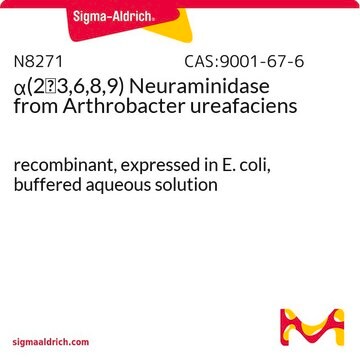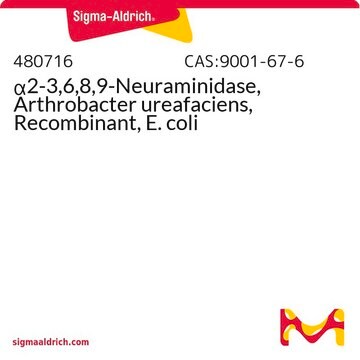N5521
α(2→3,6) Neuraminidase from Clostridium perfringens (C. welchii)
recombinant, expressed in E. coli, buffered aqueous solution, ≥250 units/mg protein
Synonym(s):
Acyl-Neuraminyl Hydrolase, Sialidase
Sign Into View Organizational & Contract Pricing
All Photos(1)
About This Item
MDL number:
UNSPSC Code:
12352204
NACRES:
NA.32
Recommended Products
recombinant
expressed in E. coli
Quality Level
form
buffered aqueous solution
specific activity
≥250 units/mg protein
mol wt
~41 kDa
foreign activity
proteases, none detected
shipped in
wet ice
storage temp.
2-8°C
Looking for similar products? Visit Product Comparison Guide
Biochem/physiol Actions
Releases α(2→3)- and α(2→6)-linked N-acetylneuraminic acid from complex oligosaccharides.
Packaging
Provided with 5× reaction buffer (250 mM sodium phosphate, pH 6.0).
Unit Definition
One unit will hydrolyze 1 μmole of 4-methylumbelliferyl α-D-N-acetylneuraminide per min at pH 5.0 at 37 °C
Physical form
Solution in 20 mM Tris-HCl, pH 7.5, and 25 mM NaCl.
Preparation Note
Expressed in glycosidase-free hosts.
Signal Word
Danger
Hazard Statements
Precautionary Statements
Hazard Classifications
Resp. Sens. 1
Storage Class Code
12 - Non Combustible Liquids
WGK
WGK 1
Flash Point(F)
Not applicable
Flash Point(C)
Not applicable
Personal Protective Equipment
dust mask type N95 (US), Eyeshields, Gloves
Choose from one of the most recent versions:
Already Own This Product?
Find documentation for the products that you have recently purchased in the Document Library.
Customers Also Viewed
Andreas Max Ernst et al.
FEBS letters, 587(9), 1411-1417 (2013-03-26)
Influenza A Neuraminidase is essential for virus release from the cell surface of host cells. Given differential structures of the N-terminal sequences including the transmembrane domains of neuraminidase subtypes, we investigated their contribution to transport and localization of subtypes N1
Weijia Wang et al.
Journal of virology, 87(8), 4642-4649 (2013-02-15)
In 2009, we successfully produced a high-yield live attenuated H1N1pdm A/California/7/2009 vaccine (CA/09 LAIV) by substitution of three residues (K119E, A186D, and D222G) in the hemagglutinin (HA) protein. Since then, we have generated and evaluated additional H1N1pdm vaccine candidates from
S Bhatt et al.
Philosophical transactions of the Royal Society of London. Series B, Biological sciences, 368(1614), 20120382-20120382 (2013-02-06)
Few questions on infectious disease are more important than understanding how and why avian influenza A viruses successfully emerge in mammalian populations, yet little is known about the rate and nature of the virus' genetic adaptation in new hosts. Here
E V Kostina et al.
Bioorganicheskaia khimiia, 38(6), 676-682 (2013-04-04)
The microchip for influenza A subtyping was developed, functioning on a principle "one spot--one subtype". Each spot contains the set of oligonucleotide probes, specific for a particular subtype of hemagglutinin, neuraminidase or matrix gene. Reliability of the proposed chip version
Audu J Natala et al.
Journal of medical entomology, 50(1), 85-93 (2013-02-23)
Amblyomma variegatum F. are obligate hematophagous ectoparasites of livestock that serve as the vectors of Ehrlichia ruminantium (formerly known as Cowdria ruminantium), the causative agent of heartwater disease. In the light of the fact that they are blood-feeding, their salivary
Articles
Understand sialic acid structure, function, signaling, and modifications. Easily find products for sialic acid research.
Our team of scientists has experience in all areas of research including Life Science, Material Science, Chemical Synthesis, Chromatography, Analytical and many others.
Contact Technical Service






